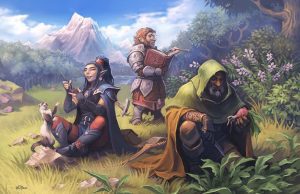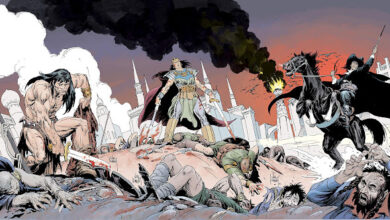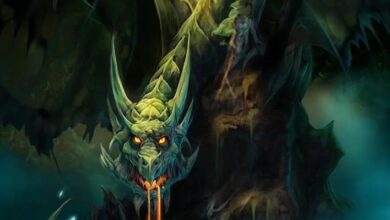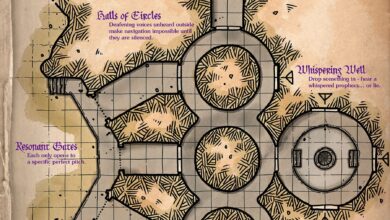Howling Tower: How I make a unique character out of their culture


Up to this point, we’ve looked at the Tales of the Valiant lineages individually, identifying their unique cultural and social traits. These aren’t the kind of traits that give you a +1 to hit with ranged weapons or an extra hit point when you level up. Those can be fun, but we’re interested in traits that make a character a gratifying roleplaying challenging.
Now that we’ve examined what makes each lineage stand apart from each other, it’s time to consider what makes characters within the same lineage distinct. Even two characters from the same heritage can come out very differently. This focus on culture will help you flesh that out.
Hear more from the Howling Tower!
Elements of Culture
Rather than tailor this to a specific campaign or setting, we’re going to take a generic approach. We’ll look at elements of culture that appear pretty much everywhere. We’ll examine twelve elements in all, but for this installment, we’re focusing on the first one, social structure (i.e., government). It’s a long one; we’ll double up on future ones.
Each category gets a list of possibilities that players can choose from or select randomly. By assembling all these elements and thinking about how they’d affect a character’s personality, you can craft a unique cultural background to enhance or tweak what they get from your lineage and heritage. Pick specific ideas, or roll dice and let fate decide. (I prefer to let randomness take charge in situations like this, but you be you.)
I Blame Society!
These characteristics are societal, not individual. Just because the community you grew up in was tightly regimented doesn’t mean you can’t be chaotic. But if you are, that probably means you were something of an outsider or a troublemaker while growing up. Someone who bucks authority in an authoritarian society must either fight constantly, learn to endure punishment, or be very secretive—all of which are interesting roleplaying hooks.
The key to using these tables is thinking about the results. Don’t just jot them down and rush on to buying weapons and armor. Consider what these broad, sometimes contradictory elements mean. How do they fit together? What effect would this combination of background influences have on the character you want to play?
For example, consider two characters who both grew up in the same town that flourished because of slash-and-burn agriculture. If one becomes a fire-slinging wizard and the other a priest of nature, they’ll have very different takeaways from their childhood experience—and different ways of interacting with the world because of that.
Finally, these lists are also useful tools for GMs looking to whip up a village, settlement, or outpost with unique attributes for characters to explore and interact with.
Social Structure
Social structure indicates how the community is governed. Does it run itself or is it controlled by an outside group? Choose one or roll a d12.
Social Structures
| d12 | Structure | Description |
| 1 | Anarchy | This society has no effective ruling structure. Everyone does what they want, when they want, how they want. The strong do as they please and the weak get pushed around. This can work well enough during periods with few external threats and no internal bullies, but it leads to failure and disaster in a crisis. |
| 2 | Families, tribes, or clans | Each family or extended family is a unit unto itself and decides its own course of action based on what’s best for it. Fairly common in nomadic cultures, less common but not unknown in settled communities. How much of a voice individuals have within the family can vary. In some societies the arrangement is highly democratic, in others decisions fall entirely on the clan’s head or a small group of elders. |
| 3 | Edenic utopia | There is no ruling structure during a period with no bullies and no external threats. People are free to do as they please, but either through social pressure or strong ethics, most people are happy (or at least willing) to do what’s best for everyone. How the community deals with troublemakers is an interesting question. Like all utopias, it’s fragile. One severe blow can unspool it. |
| 4 | Democracy | Communal decisions are made by vigorous public debate followed by voting. Everyone votes—depending on how you define “everyone.” It might mean literally everyone, or adults only, men only, women only, warriors only, people who own at least twenty acres and three cows only, or heads of households whose families have been in the village for at least three generations. This is a durable, effective system for small populations but direct democracy becomes unwieldy in large populations. |
| 5 | Republic | Citizens vote to choose someone to represent their interests on a council. In theory, the representatives are answerable to the people who sent them. It’s still always a good idea to watch them for signs of corruption and shifting loyalty. |
| 6 | Confederation | The community is one of a group of communities that work together for mutual protection, trade, or cooperation. Member communities probably are republics, with each one sending a few representatives to a central decision-making council. If you don’t like that idea, roll again to find out the specific structure of your home community. Confederations often have more of a mercantile focus than military. Members favor trade coming from other members rather than outsiders, and thus members profit at the expense of outsiders. |
| 7 | Feudal | A feudal structure is similar to a confederation but with vestiges of democracy replaced by military rule and mercantile concerns replaced by military ones. The community is commanded by a local warlord with a retinue of professional soldiers reigning from a nearby stronghold. That warlord serves a bigger, stronger warlord who rules a handful of similar communities. That warlord might in turn serve an even bigger, stronger warlord. All these feudal holdings are bound together by vows or contracts of loyalty and mutual defense. Because the warlord depends on taxes to keep soldiers loyal and stay in power, individuals who don’t like the situation might not have freedom to pack up and leave for greener pastures. |
| 8 | Theocracy | This community is run by a religious elite, probably housed in a significant temple. The religion might be universal, it might be widespread, or it might limit itself to a handful of inner circle “true believers.” In any event, all matters are decided by church elders based on church dogma and divine portents, as interpreted by the elders. Church elders might be skilled diplomats more steeped in worldly realpolitik than in theology. |
| 9 | Hereditary ruler with limited power | The person in charge is chosen by destiny. Most likely they’re the oldest son or daughter of the previous ruler, but traditions can vary. These rulers have a lot of power, but law or tradition places at least some limitations on it. For example, they might not be allowed to condemn anyone to death without a trial, to increase taxes without approval from a council of elders, or start a war without consulting the high priests’ omens. In other words, their actions are restrained by laws either written or unwritten. |
| 10 | Hereditary ruler with absolute power | The ruler is chosen by destiny, and the ruler’s power is absolute. The potentate’s word is law, even if it changes from one day to the next. If the ruler is wise, competent, and benevolent, this system can work nicely. Still, “absolute power corrupts absolutely” isn’t just a catchy slogan. |
| 11 | Colony of a friendly neighbor | A nearby kingdom or town took over this area by sending in colonists or settlers. The area might have been empty before, or it might have already had plenty of residents who were displaced by the newcomers who had more money, stronger social cohesion, or better technology (or magic). The town might have any sort of government (choose one or roll again), but it’s perfunctory. Real decisions are handed down by the colonizing power. Characters from this type of home might be from either side. |
| 12 | Subject of a hostile neighbor | The community was seized by force before being colonized. Previous leaders weren’t simply displaced. They were exiled, imprisoned, or executed—or possibly suborned into betraying their previous sovereign and swearing loyalty to the new regime. Two distinct layers of society coexist: conquerors and conquered. The area might have any sort of government in name, but they all boil down to martial law. A character from here can choose which side they’re from. |
Check out Campaign Builder: Castles & Crowns for an even deeper look into government in roleplaying!



